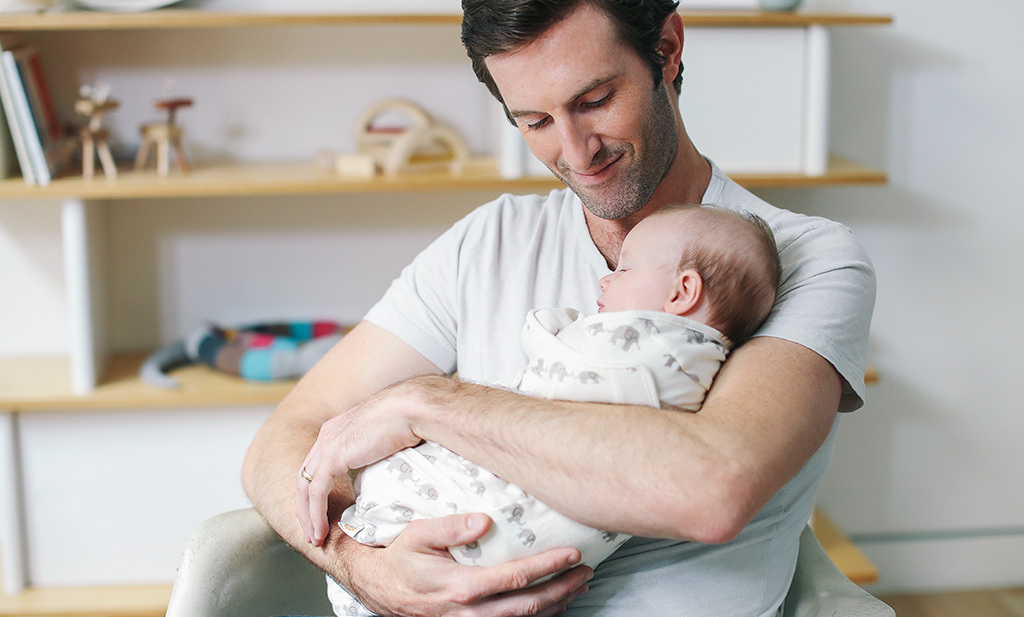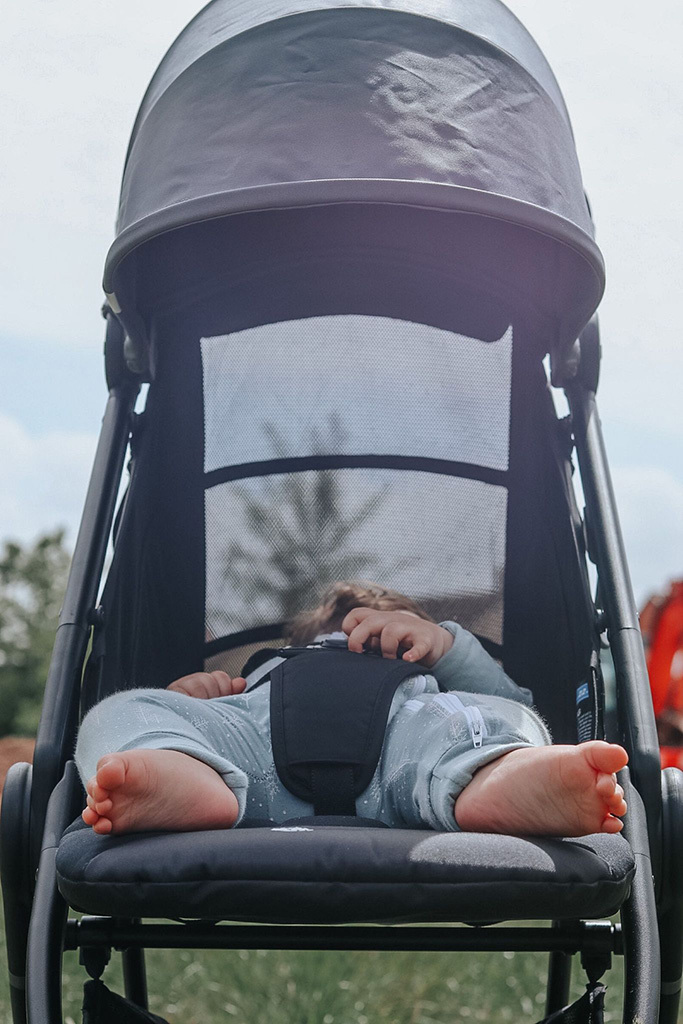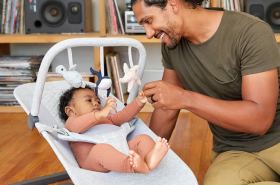
Baby Sleep After Travel blog
Summer! Finally! Many of us will be planning on taking a trip at some point this year, whether that’s a long break overseas or a short trip close to home. Our UK sleep specialist Gemma Coe is a mum of two and is a certified baby and child sleep consultant. She helps families all over the world develop healthy sleep habits. Today, Gemma talks to us about getting your baby’s sleep back on track after your holiday travel.
I’m writing this blog two days after returning from a camping trip in France with my family so it’s great timing. I heeded my own advice whilst on our trip. “Try really hard not to worry about sleeping too much and just concentrate on having fun. Holidays are precious”. So yes, this happened. The kids had late nights, fun nights and there was zero recognition of the bedtime routine!
That was great whilst away, suited us really well. We could eat together as a family in the evenings and even have a little lie-in (which is unusual as my son is an early bird).
I do have to say I was a little worried (as most parents would be, regardless of whether you’re a sleep consultant or not!) about the return home and whether they’d adjust. Baby sleep during and after travel can be a little troublesome so let’s take a look at a few tips.
Your holiday routine is just that.
If you’re coming home or are now home from your trip it may be worth reflecting and thinking about any new sleep associations or new habits that crept in during your holiday. Some sleep habits may have been great, as kiddies can suddenly surprise you with their adaptability! Other sleep associations were perhaps fine for the period you were away for, but you don’t really want to bring back home. Getting back on track with good sleep habits may take a few days.
That’s just it though, our usual routine is easier in our own home, and it will feel familiar when we return. Don’t worry, going back into our usual bedtime routines will feel easier for everyone at home as we tend to do one thing after another naturally.
Reasons sleep problems develop on holiday.
You may come home expecting everything to snap back to normal, however you may experience some difficulties at the start. Not everything is easy unfortunately. Initially you may fear that the holiday has caused a sleep regression. However, there are multiple reasons why baby sleep may change when you’re away.
- New time zone changes forcing schedules to change and jet lag to occur.
- Different sleeping setups, you may co-sleep, room share or have an unusual set up and different sleep space to contend with.
- Doing ‘what works’ and the ‘need for speed’! Perhaps you went away with others and were worried about the bedtime ‘put down’ or your little one disrupting others at night. The simplest way to settle your little one would then be to provide more input than you would usually do at home. This may have been feeding or rocking to sleep, or using a pram or stroller for naps which is different from what you do at home.
- Routine shift. Often when away, restaurants may not open until later and so it makes sense to adjust little ones sleep to later nights.
- Your kiddie just had too much fun! Why would they sleep when they can be exploring new surroundings?! This is great in the short-term and I really encourage families not to worry about getting enough sleep whilst away, but a lack of sleep over several days can build up some sleep debt.
- That you needed to make other changes too. Perhaps it was so hot and your little one didn’t fancy those daytime feeds. They may have flipped into a different pattern of feeding more frequently at night. When we get home, we also have to work on redistributing the nighttime calories back to daytime feeds.
- That, these problems would have happened anyway. We all know by now that sleep isn’t linear and doesn’t constantly improve, there can be a sleep regression at various points in your child’s first years. If you were away whilst your child was around the 4-month mark, or they started walking for example, then it’s likely you would have experienced changes regardless of where you were in the world!

Time zones!
The return from France wasn’t too tricky to navigate. The same is true for most of Europe too. If this is where you’re travelling to then you can keep your kiddies on the same time zone (which gives you the later evenings to eat out and a little lie in). So, when they return home there’s effectively no difference and no need to shift any schedule.
However, long trips east or west can really throw us off schedule.
How do you adjust your child’s sleep schedule back to normal?
Internal body clocks are stubborn beasts, and it can take a while to shift them back on track if you’ve travelled over multiple time zones. You may be able to shift your baby or toddler schedule by about 30 minutes a day. Make sure you work on changing mealtimes too.
Use natural light to your advantage when shifting schedules too. Exposing yourself to natural light (or darkness) is a powerful cue for the body to fall asleep.
It may be helpful to factor in some active outdoor play to work on tiring them out before their slightly earlier bedtime too!
The more time zones you’ve travelled the longer it will take to adjust. That’s ok, just factor this in. Of course, you may be returning to work and have to wake earlier in the morning which may force a big change but offer your little one the opportunity to have a longer or earlier nap time if needed to catch up.
Remember this is just temporary and this time next week your child’s sleep will be back to the normal sleep routine.
Help! They’ve forgotten to fall asleep independently.
This can happen! It may be that they were happy little independent sleepers before but whilst away you’ve bed shared or have been sleeping in the same room. Your little one may have cleverly worked out that an opportunity to be room sharing with a parent is NOT TO BE MISSED!
Therefore, when you return home, they’ll probably protest and bedtime settling may not be as smooth as it was prior to going away. They may even experience a little separation anxiety.
That’s ok. Allow some extra time for the bedtime routine the first few nights to provide your toddler with some support and reassurance. If they are quite upset, then we can gently shift them back towards being an independent sleeper by each day doing a little less. You may need to stay with them for a few nights but can then move to checking in or popping out of the room as their build back their confidence and familiarity with sleeping in their own sleep space.
5 Tips to Help Kids Sleep Stay on Track After Travelling.
#1 Too tired?
An early bedtime won’t hurt. You can then push it back 15 minutes each day, over a few days, towards their normal schedule. Equally, if they’re just not making it through the day then you may want to consider a slightly earlier, or longer nap. You can always gradually reduce them as the week goes on and you get back towards your normal routine.
#2 Bedtime routine
As much as possible return to and repeat the same process and routine as you had before you went away. This will help bring back the familiarity and the expectations of what comes next and get sleep back on track.
#3 It’s OK to feel a bit sad!
Talk it through, you can recognise any feelings of sadness on your return, but be confident and consistent when revisiting the structure you had in the past. Their own bed may not be that preferable at the moment, so work on spending some time in their room with some positive play so they begin to have positive associations with their sleep space again.
#4 Natural lights
Use the environment to your advantage. Environmental factors such as light and noise can really help our internal clock. If they’re tired too early in the evening try natural light, or equally dim the lights if they’ve been used to a later bedtime.
#5 Ask for help
If you get really stuck, reach out for help. Temporary changes to a sleep schedule can often be resolved easily without the need for any formal sleep training. However, it may take another pair of eyes to help you get back on track.
__________________________________________________________________________________



